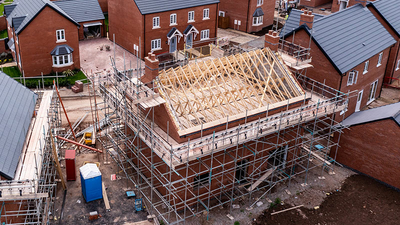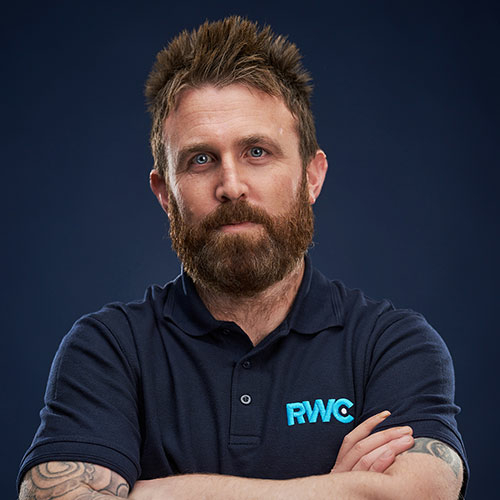New tech for new build heating and plumbing

New build homes are created with efficiency front of mind – and every aspect of construction, including plumbing and heating, forms a key part of the puzzle.
Last year’s updates to the Building Regulations introduced new measures for the efficient performance of new build houses, including the requirement to deliver CO2 savings of 31% compared to previous standards. These adjustments set the scene for the forthcoming Future Homes Standard, which is anticipated for 2025 following the conclusion of consultations on the documentation this year.
To achieve these heightened levels of efficiency, a whole-building approach is required, combining low carbon and sustainable technologies with a fabric-first approach. In practice, this means the physical structure will work harder to maintain internal temperatures, while plumbing and heating systems themselves will deliver greater levels of efficiency.
So, what are the technologies supporting installers to achieve the updated standards required of new build homes?
Sustainable heating
Part of the updated regulations surrounding heating in new build homes is the banning of fossil fuel-powered boilers from 2025. As gas boilers have been the dominant heat source in British homes for several decades, this presents a notable shift in focus – and it will have a direct impact on plumbing and heating installers who must adapt to new technologies.
There are two technologies that are widely discussed as the ultimate alternative to gas boilers: heat pumps and hydrogen. As hydrogen tests so far have been hampered by safety and cost concerns, heat pumps are leading the way as highly efficient domestic heat sources with around 37,000 certified installations in 2023. As a result, many housebuilders are already fitting heat pumps as standard, preparing properties for a more sustainable future.
While heat sources are a critical part of domestic systems and installers can upskill to ensure they are comfortable working with them, there are additional measures that contribute to home efficiency.
Alongside the shift away from gas boilers, traditional radiator systems may also begin to disappear from homes as new builds adopt more efficient and sustainable alternatives, such as underfloor heating (UFH). UFH systems operate at considerably lower temperatures than radiators and, as such, place less pressure on their heat source, making them a perfect fit alongside heat pumps which emit lower temperatures than gas boilers. Together, the pairing of heat pumps and UFH is resulting in fewer carbon emissions being generated by home heating.
Further maximising the potential of UFH is the smart technology that goes alongside them, enabling end users to stay in control of their heating. Advanced thermostats, for instance, can be paired with smartphone apps to help occupants manage their heating, comfort and running costs.
By understanding the various layers that contribute to sustainable home heating, and upskilling where necessary to ensure correct installation, installers can play a key part in ensuring new build homes meet all the requirements of a sustainable future.
Future-proof systems
To ensure new build properties are fit for the future, much of the work carried out by installers will take place behind the scenes. From installing innovative water control valves that support system performance, through to technologies that safeguard systems and drive efficiency, the work of installers is instrumental to meeting sustainability targets.
An essential part of efficient plumbing systems is the effective use of water, ensuring adequate control of water usage to manage consumption and reduce wastage. As a result, water conservation is a focus in new build homes, with effective systems having the potential to reduce daily consumption without impacting user habits.
Pressure Reducing Valves (PRVs), fitted where water first enters a home, can be instrumental in water conservation. While they’re not currently a requirement in new build homes, they can form an essential part of the solution to creating sustainable homes. Once installed, PRVs will reduce the mains pressure to protect against surges and stabilise the flow rate through the property.
As well as managing the pressure and flow rate at the point of entry, installers can utilise flow regulating valves – such as the Reliance Valves Floreg Isolating Valve – to regulate the flow of water to certain appliances. This will ultimately help to keep consumption levels consistent, preventing unnecessary fluctuations that can stand in the way of sustainability.
Besides these straightforward solutions, installers can go even further to elevate efficiency when creating plumbing and heating systems for new build homes. The MultiSafe Leak Detector by Reliance Valves is an innovative leak detection and water management system that continuously monitors and measures the flow rate and pressure against pre-determined consumption levels at the PRV. As well as keeping water usage on track, this technology can also safeguard systems – and homes – from failures, leaks and costly water damage.

Manufacturer support
As government initiatives and shifting legislation bring about a significant shift in the construction of new build homes, plumbing and heating installers will need to adapt their skills and ways of working to meet new demands.
But installers aren’t alone in responding to the quickly evolving landscape. Manufacturers are spearheading the development of innovative technologies that not only answer the need for greater sustainability but do so in a way that makes adoption easy for installers of every experience level.
Through our family of brands – JG Speedfit, JG Underfloor and Reliance Valves – we are delivering the systems, solutions and technologies that make sustainable plumbing and heating possible for new build developments. Plus, with every product backed by our experienced team, installers can rely on RWC to navigate the changes they’re facing.
Stay connected
Take a look at our blog to find the latest insights and advice for plumbing and heating professionals.
